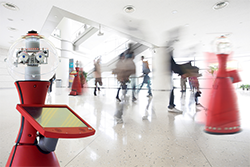Mobile Robotics
Mobility is a key enabling technology for most robotic applications. We have a long tradition of working with mapping, localization and navigation. That is, making the robot know what the environment looks like, where it is in this environment and how to move from one place to another. We also do research in spatial cognition, i.e., understanding the world around the robot beyond the geometry.

What type of environment is the robot in? An office? A corridor? We investigate how long-term experiences of the environment can help the robot to perform its tasks better by being able to reliably distinguish between what is static, dynamic and somewhere in between and generate a better overall understanding of how to model the environment.
Underwater Robotics
The oceans are important economically, environmentally and militarily. The seafloor is mostly unexplored despite being most of the earth surface. Mars is much better mapped. The challenges to reaching and operating in this environment are among the hardest in robotics. RPL is part of network that includes companies such as SAAB and MMT and research groups such as polar researchers and marine cultivation. Our focus is on making current AUVs more autonomous by giving them better navigation and planning capabilities.

Coordination of Multi-agent teams
A Multi-agent team performing a task can often improve robustness, flexibility and performance, as compared to a few more complex agents. Robustness is improved by reducing the impact of single failures. Flexibility is improved by the possibility of moving agents to different locations to perform simultaneous work, and performance can be improved by e.g. providing sensing capabilities across a larger area in a search task. In this research activity we study how to design efficient decision making schemes for Multi-agent teams performing different tasks, such as formation obstacle avoidance, search, pursuit-evasion, patrolling, or performing adversarial games.
Projects
We are currently involved in the following projects:
-
VR XPLORE 3D
Past projects
Past projects we were involved in:
- VINNOVA/FFI iQMatic
-
VR XPLOIT
Contact
For more information, please contact involved faculty members:
